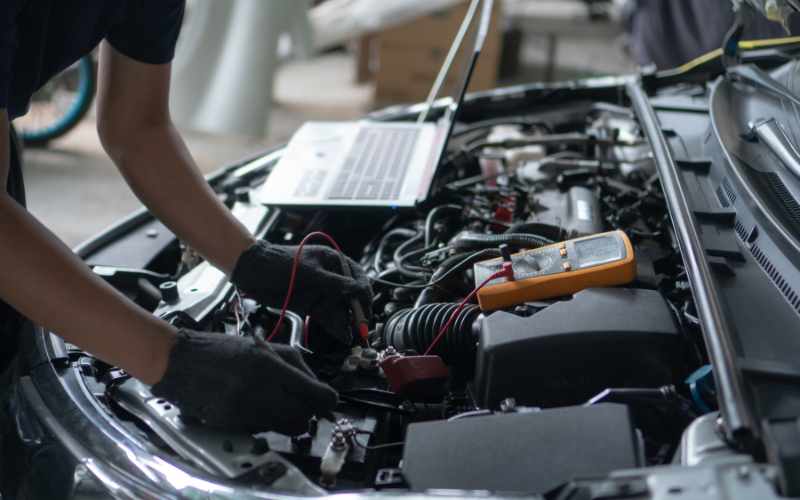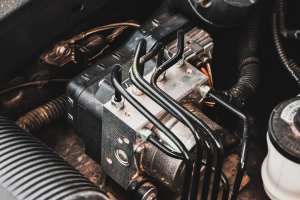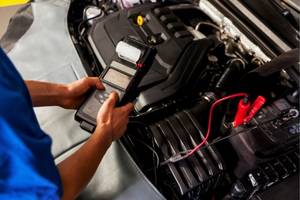Introduction
If you're a Infiniti owner, you understand the importance of keeping your vehicle in excellent condition. But what happens when your ECM (Engine Control Module) starts causing issues? Don't sweat it—this guide is designed to help you identify common Infiniti ECM problems, choose the right tools, follow the best Infiniti ECM repair solutions, and maintain your ECM post-repair. Let's get started!
1. Identify Common Infiniti ECM Problems
Your ECM is the brain of your vehicle—it controls multiple engine functions such as fuel mixture, ignition timing, and variable valve timing. So, when something goes wrong, it's important to identify the issue quickly. Here are some common Infiniti ECM problems you might come across:
Check Engine Light: This little light can indicate a whole host of issues—some serious, some not so much. If it's blinking, it's time to look into the best Infiniti ECM repair solutions.
Poor Fuel Economy: Notice you're filling up the tank more often? Your ECM might be the culprit. It could be adjusting your fuel mixture inappropriately, leading to higher fuel consumption.
Engine Misfires or Stalling: If your engine is running rough, stalling, or even misfiring, a faulty ECM could be to blame.
Transmission Issues: Rough shifts? Your ECM might not be correctly controlling your engine's timing.
Failed Emission Tests: If you're failing emission tests and your vehicle is belching out more pollutants than it should, your ECM might need some attention.
Remember, these are just potential signs of an ECM issue. Diagnosing ECM problems requires a thorough understanding of your vehicle's operations. In fact, some of these symptoms might overlap with other vehicle issues. So, keep calm, and let's move on to choosing the right tools for the job.
Once you've identified potential ECM issues, it's time to equip yourself with the right tools. After all, the right tools can make the difference between a successful repair and a frustrating experience. So, what should you have in your tool kit for the best Infiniti ECM repair solutions?
OBD-II Scanner: A good OBD-II (Onboard Diagnostic) scanner is the first thing you need. It reads diagnostic trouble codes (DTCs) from your ECM, giving you a clearer picture of what's going wrong.
Multimeter: This vital tool measures voltage, resistance, and current, helping you identify electrical issues that might be affecting your ECM.
ECM Repair Manual: Don't underestimate the value of a good old-fashioned repair manual. It can provide invaluable information on how to troubleshoot and repair ECM issues specific to your Infiniti model.
Quality Soldering Tools: If your ECM requires more advanced repair, such as replacing capacitors or rectifying poor solder joints, quality soldering tools are a must-have.
Basic Hand Tools: Don't forget the basics. A good set of screwdrivers, pliers, and wrenches can come in handy when you need to remove and replace the ECM.
Remember, quality matters when choosing your tools. Better quality tools can help ensure a smoother, more efficient repair process. And who knows, with the right tools in hand, you might be able to identify and fix other vehicle issues too! Next up, let's delve into the best practices for diagnosing your Infiniti ECM. Ready? Let's go!
3. Follow Best Practices for Infiniti ECM Diagnosis
So, you're armed with the right tools. Great! Now, let's talk about diagnosing your Infiniti ECM — the heart of your car's electronic system. Following best practices can mean the difference between a precise, effective repair and a time-consuming guessing game. So, what are the best ways to diagnose your Infiniti ECM?
Use Your OBD-II Scanner Wisely
Scanning your ECM for trouble codes is one of the first steps in diagnosing your Infiniti ECM. But remember, an OBD-II scanner only points you in the direction of the problem. Understanding what the codes mean and investigating further is key.
- Look up the code in your ECM repair manual or a trusted online source.
- Don't jump to conclusions — one code might point to multiple potential issues.
- Use the data from your scanner to guide your further diagnosis.
Investigate Physical Damage
Sometimes, the best Infiniti ECM repair solutions involve a little detective work.
- Check the ECM for visible damage such as corrosion, burnt components, or loose connections.
- Inspect the ECM’s housing to ensure it is intact and securely mounted.
- Look for signs of water damage, as moisture can cause all sorts of havoc with electronic components.
Test Electrical Connections
Your multimeter is your best friend here.
- Test the ECM’s power and ground circuits for voltage and resistance.
- Check the continuity of various circuits to ensure that they are complete and not broken.
- If possible, test the signals from the ECM to the actuators and sensors.
Diagnosis is a critical step towards achieving the best Infiniti ECM repair solutions. So, take your time — a thorough diagnosis can save you from unnecessary repairs and expenses. Now, let's move on to the actual repair techniques. You're doing great so far!

4. Implement Effective Infiniti ECM Repair Techniques
You've identified the issue. You've got your tools. You've diagnosed the problem. Now, let's roll up those sleeves and dive into the actual repair work. Here's how to implement the best Infiniti ECM repair solutions with a hands-on approach:
Repair or Replace Damaged Components
Once you've identified the faulty components, you have two options — repair or replace.
- If it's a minor issue like a loose connection, you might be able to fix it with your trusty soldering iron.
- For more serious problems like a fried capacitor or a corroded circuit board, replacement is the way to go.
Remember, always use high-quality replacement parts. They might cost a bit more, but they tend to last longer and perform better.
Re-flash the ECM
Sometimes, the problem isn't with the hardware, but the software. In such cases, re-flashing the ECM might be the solution.
- Connect your Infiniti to a reliable ECM re-flashing tool.
- Follow the instructions provided by the manufacturer or the software.
- Be careful — a wrong step here can turn your ECM into a very expensive paperweight.
Seek Professional Help
Let's face it, not all repairs can be done in your garage.
- If the problem is too complex, or if you're not confident about your repair skills, seeking professional help is a wise move.
- Look for a mechanic or a service center that specializes in Infiniti ECM repairs for the best results.
Implementing these best Infiniti ECM repair solutions will have your Infiniti running in top shape in no time. Now, the next step — and this is just as important — is maintaining your ECM post-repair. Ready to learn how? Let's go!
5. Maintain Your Infiniti ECM Post-Repair
Alright, your Infiniti is purring like a kitten again. But remember, a well-maintained ECM equals a happy Infiniti. Here's how you can ensure your ECM stays in top-notch condition:
Regular Check-ups
Just like us humans, cars too need regular check-ups.
- Schedule routine inspections of your ECM.
- Make sure all connections are secure and the components are in good shape.
These check-ups can help you spot issues before they escalate, ensuring your ECM always provides the best performance for your Infiniti.
Keep the Software Updated
Your Infiniti's ECM software isn't much different from your smartphone's OS — it needs regular updates.
- Regularly check for software updates from the manufacturer.
- Remember to re-flash your ECM whenever an update is available.
This way, you’ll stay on top of any performance improvements or bug fixes, keeping your Infiniti at its best.
Protect Your ECM from Elements
The ECM is like the brain of your Infiniti, and you wouldn't want your brain getting wet or overheated, would you?
- Ensure the ECM is well protected from water, heat, and dust.
- Check the ECM's housing and seals regularly for any signs of wear and tear.
Taking these steps will help you maintain your Infiniti ECM post-repair, ensuring you get the most out of the best Infiniti ECM repair solutions.
And there you have it! From identifying problems to maintaining the ECM post-repair, you're now equipped with the knowledge to keep your Infiniti running smoothly. So, what's your next automotive adventure?
Conclusion
By now, you should feel more confident in determining, diagnosing, and repairing ECM issues in your Infiniti. From recognizing common problems and providing yourself with the right tools to following best practices for diagnosis and implementing effective repair techniques, you are well on your way to making sure your vehicle runs smoothly. Remember, regular maintenance and timely check-ups are key to increase the life of your ECM and, by extension, your Infiniti. Happy driving, and here's to a trouble-free automotive journey!
FAQs
1. What are the most common symptoms of a failing Infiniti ECM?Some common symptoms include the check engine light turning on, poor fuel economy, engine misfires or stalling, transmission issues, and failed emission tests.
2. Can I diagnose Infiniti ECM problems on my own?
Yes, with the right tools such as an OBD-II scanner, multimeter, and a detailed repair manual, you can diagnose ECM problems. However, if you doubt, it's best to seek professional help.
3. What tools are essential for Infiniti ECM repair?
Necessary tools include an OBD-II scanner, multimeter, ECM repair manual, quality soldering tools, and basic hand tools like screwdrivers, pliers, and wrenches.
4. Is it better to repair or replace a faulty ECM?
It depends on the issue. Minor problems like loose connections can be repaired, but serious issues like fried capacitors or corroded circuit boards often require replacement with high-quality parts.
5. How can I maintain my Infiniti ECM post-repair?
Regular check-ups, keeping the software updated, and protecting the ECM from elements like water, heat, and dust are important for maintaining your ECM.
6. When should I seek professional help for ECM issues?
If the ECM problem is too complicated, or if you're not confident in your repair skills, it's wise to seek help from a mechanic or a service center specializing in Infiniti ECM repairs.
FAQs on
Best Infiniti ECM Repair Solutions: Comprehensive Guide for Best Practices



